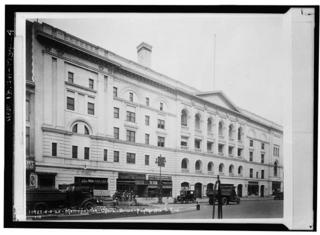Economic Liberalism and the Art of Opera in America
"Now, at the age of 59, Oscar [Hammerstein's] obsessive passion for opera would bear remarkable fruit. In 1906, Oscar opened his eighth theatre - his second Manhattan Opera House and assembled a company of opera singers who could act. [He built his first theatre in 1889, the Harlem Opera House, on 125th Street, at a time when Harlem was still a largely uninhabited stretch of goat farms and shantytowns.] He combined his love for opera with his experience as a showman. For four astonishing years Oscar's Manhattan Opera Company would financially and creatively dominate the world of grand opera in New York City. In 1908, he expanded his operatic ambitions nationally by building his ninth theatre - the Philadelphia Opera House [in Philadelphia].
He presented the immensely successful American debuts of Mary Garden and Louisa Tetrazzini. His company included such stellar performers as Nellie Melba, Emma Trentini, Giovanni Zenatello, Allesandro Bonci, Maurice Renaud, Charles Dalmoräs, Mario Sammarco and John McCormack. Oscar emphasized contemporary works, offering the American premieres of Louise, Pellêas et Mêlisande, Elektra, Le Jongleur De Notre Dame, Thais, Sapho and Grisêlidis, and such controversial works as Salome and Hêrodiade. He rediscovered and popularized Les Conte D'Hoffman and Samson et Dalila. He offered outstanding productions of traditional standards such as Aida, Carmen, La Traviata, Otello, La Boheme, Tosca, Rigoletto, Il Barbiere Di Siviglia and scores of others.
He could outwit them for a while, but he could not outspend them in the long run. The competition with the Met had so inflated the cost of opera production and so saturated the public's interest for opera that by his fourth year Oscar was going bankrupt. Oscar's son Arthur Hammerstein stepped in and negotiated a deal with the Met board of directors, led by financier Otto Kahn, which offered Oscar a flat sum of $1,200,000 in exchange for his written promise to refrain from producing grand opera in the United States for 10 years. He begrudgingly accepted the buy-out, but declined the Met directorship's invitation to a conciliatory dinner in his honor with the lament: "Gentlemen, I am not hungry."
Obsessively unstoppable Oscar took the money and promptly moved to England to build his tenth theatre - the London Opera House [no longer existing]. Again, he waged another quixotic and financially ruinous opera war with Covent Garden's royal opera company. A reporter asked Oscar if there was any money in opera. Oscar replied, "Yeah, mine." ... He died almost completely broke in 1919, one year shy of [his agreed ban with the MET on producing grand operas'] conclusion, while negotiating with singers and planning his next return to opera's center stage.
Source: Oscar Hammerstein III "Oscar Hammerstein (1847-1919)"
The Jewish Virtual Library (c) 2005 The American-Israeli Cooperative Enterprise
http://www.jewishvirtuallibrary.org/jsource/biography/
hammerstein.html

Metropolitan (Philadelphia) Opera House, 1908,
in Philadelphia, Pennsylvania
(Currently owned by Center at the MET Inc., Holy Ghost Headquarters Revival. Present exterior condition "below average".)
Photo credit: Data bank of Philadelphia Architects and Buildings http://www.philadelphiabuildings.org/pab/
As of August 10, 2005, the PAB database contains more than 216,944 projects and buildings, 20,428 architects, engineers and contractors, and over 80,631 images. The PAB Project is supported by the William Penn Foundation.
He presented the immensely successful American debuts of Mary Garden and Louisa Tetrazzini. His company included such stellar performers as Nellie Melba, Emma Trentini, Giovanni Zenatello, Allesandro Bonci, Maurice Renaud, Charles Dalmoräs, Mario Sammarco and John McCormack. Oscar emphasized contemporary works, offering the American premieres of Louise, Pellêas et Mêlisande, Elektra, Le Jongleur De Notre Dame, Thais, Sapho and Grisêlidis, and such controversial works as Salome and Hêrodiade. He rediscovered and popularized Les Conte D'Hoffman and Samson et Dalila. He offered outstanding productions of traditional standards such as Aida, Carmen, La Traviata, Otello, La Boheme, Tosca, Rigoletto, Il Barbiere Di Siviglia and scores of others.
He could outwit them for a while, but he could not outspend them in the long run. The competition with the Met had so inflated the cost of opera production and so saturated the public's interest for opera that by his fourth year Oscar was going bankrupt. Oscar's son Arthur Hammerstein stepped in and negotiated a deal with the Met board of directors, led by financier Otto Kahn, which offered Oscar a flat sum of $1,200,000 in exchange for his written promise to refrain from producing grand opera in the United States for 10 years. He begrudgingly accepted the buy-out, but declined the Met directorship's invitation to a conciliatory dinner in his honor with the lament: "Gentlemen, I am not hungry."
Obsessively unstoppable Oscar took the money and promptly moved to England to build his tenth theatre - the London Opera House [no longer existing]. Again, he waged another quixotic and financially ruinous opera war with Covent Garden's royal opera company. A reporter asked Oscar if there was any money in opera. Oscar replied, "Yeah, mine." ... He died almost completely broke in 1919, one year shy of [his agreed ban with the MET on producing grand operas'] conclusion, while negotiating with singers and planning his next return to opera's center stage.
Source: Oscar Hammerstein III "Oscar Hammerstein (1847-1919)"
The Jewish Virtual Library (c) 2005 The American-Israeli Cooperative Enterprise
http://www.jewishvirtuallibrary.org/jsource/biography/
hammerstein.html

Metropolitan (Philadelphia) Opera House, 1908,
in Philadelphia, Pennsylvania
(Currently owned by Center at the MET Inc., Holy Ghost Headquarters Revival. Present exterior condition "below average".)
Photo credit: Data bank of Philadelphia Architects and Buildings http://www.philadelphiabuildings.org/pab/
As of August 10, 2005, the PAB database contains more than 216,944 projects and buildings, 20,428 architects, engineers and contractors, and over 80,631 images. The PAB Project is supported by the William Penn Foundation.


0 Comments:
Post a Comment
<< Home